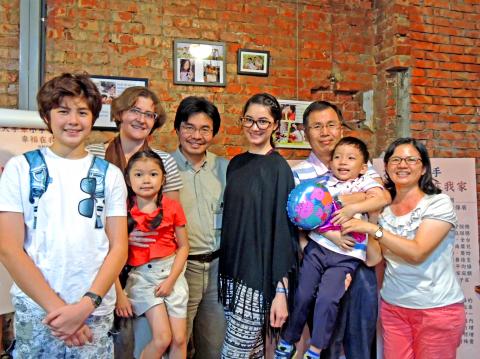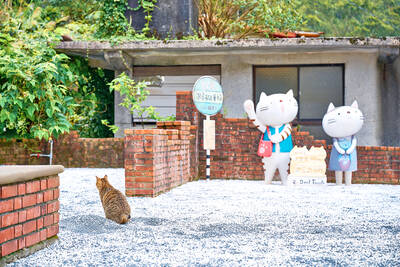Su Shih-jung and his wife, Hsieh Pao-chuan, have been raising an developmentally delayed child with love. “If he were our child by birth, we would have no choice but to go on and raise him,” they say, “so how could we give up on him just because he is adopted?”
They say they had pondered over this question early on, but deep inside they knew clearly, “Children are not objects, so how can you just reject and replace them? It makes no difference whether they are your biological children or not.” Since the couple had thought this through and lived with the child for a while, it would have been even more difficult for them to part with him.
Su and Hsieh have been married for 15 years, during which time they saw the best doctors of Chinese and Western medicine that they could find in order to bear a child. They tried alternative medicine, artificial insemination, injections and so on, which were physically and mentally unbearable. They not only had to pay the medical expenses, but also had to experience the disappointment of failure after being hopeful. They say that those who have not experienced the same thing find it hard to understand their disappointment and helplessness.

Photo: Hung Jui-chin, Taipei Times
照片:自由時報記者洪瑞琴
After discussing adoption, reaching a consensus, going through the adoption procedures and obtaining approval, they finally adopted En-en, only to find that this child had an intellectual development disorder. However, as far as they were concerned, “adoption is a commitment made for a lifetime.” Even though this child’s language and movement development is slower than average kids — he did not begin learning to walk until one and a half years old and still cannot say “daddy” and “mommy” — the couple give him their complete love and acceptance. They patiently accompany him at his early-childhood intervention sessions and use music, language and occupational therapies and other resources to help him develop and grow.
En-en, now in his final year at kindergarten, makes progress day by day, and every day brings a new surprise for the couple. Although there is still a long way to go in the future, they say firmly, “As long as we stand by the love and commitment we made, we can change everything.”
In another family, Chen I-kuang and his Polish wife Dorota Chen-Wernik already had a son and a daughter, but to bring more diversity and love into the family they adopted Ling-ling, a three-year-old girl.
Chen says that in the first few months of the trial adoption period Ling-ling exhibited some anxiety because of the new environment and new family members. Thankfully the family has a policy that says, “If something bothers you, let’s talk about it,” which is a fairly democratic way of running a household. Thanks to the love and care of Chen’s wife and two children, Ling-ling finally recognized her importance in the new family and in the hearts of her new parents.
Now Ling-ling loves to sing and dance with her sister and play Lego with her brother. Chen and Dorota say that the pure love among the family members is their truest happiness.
(Liberty Times, translated by Ethan Zhan)
蘇士榮、謝保釧夫婦以愛心陪伴發展遲緩的孩子成長。「若是自己親生的,沒辦法仍是得養;若是收養的,難道就要放棄了嗎?」
他們說自己曾思索過這問題,但是內心很清楚知道「孩子不是物品,怎能不想要就換?無關乎是否有親生血緣關係。」想通了這道理,而且已經和小孩相處了一段時間,更是不捨這份親情。
蘇謝結婚十五年,為了求子尋遍中西名醫、民間偏方,也試了人工生殖、打針等方式,身心飽受煎熬。不僅需承擔有形的醫療費用,更需面對滿懷期待爾後卻失敗的心情落差。他們說,非親身體驗者難以體會其中的失落與無奈。
夫妻兩人從討論收養,確認一致共識, 經過一連串收養歷程,到通過審查,最後終於收養了恩恩。後來卻發現孩子有發展遲緩障礙。然而,對他們來說,「收養是一輩子的承諾。」即使恩恩語言及動作發展都較一般孩子緩慢,一歲半才開始學習走路,也還不會開口叫爸爸、媽媽,但夫妻給予他全心的愛與接納,耐心陪伴恩恩進行早期療育課程,並利用音樂、語言、職能治療等各項資源協助孩子成長發展。
目前就讀大班的恩恩每天都有進步,每天也都帶給夫妻倆不同的驚喜。雖然未來的路還很長,但他們堅定的表示:「堅守這份愛與承諾,就能改變一切」。
另一個家庭是陳怡光和他的波蘭太太魏多麗。這對夫婦已經擁有一對兒女,為了讓家庭更多元與擁有更多的幸福,夫妻倆收養已經三歲的玲玲。
陳爸爸說,試養初期幾個月,玲玲面對新的環境與家人會出現一些緊張焦慮的情緒,還好家裡向來是「有什麼不開心,就要講出來」,很民主作風。在妻子與兩位子女關愛下,玲玲終於肯定自己在新家庭及父母心中的重要位置。
現在的玲玲喜歡和姊姊一起唱歌跳舞,喜歡和哥哥一起玩積木。陳爸和魏多麗說,和家人間單純的愛,就是真切的幸福。
(自由時報記者洪瑞琴)

A: There are always adventurers who want to conquer Taipei 101 as a world-class landmark. Didn’t someone once parachute from the top of it? B: Yeah, that’s right. Austrian extreme sportsman Felix Baumgartner once parachuted from the rooftop observation deck in 2007 without permission. He died earlier last year in a powered paragliding crash at the age of 56. A: Hollywood superstar Tom Cruise also almost jumped off Taipei 101 for “Mission Impossible 3.” B: What? But I didn’t see the building in the movie. A: The news says that the film’s producers applied to the Taipei City

People use far more than just spoken language to communicate. Apart from using our voices to pronounce words, we also use body language, which includes countless facial expressions. Most people know that smiles and frowns indicate pleasure and displeasure, or that wide eyes with raised eyebrows typically show surprise. However, there is a lot more to learn about how facial expressions can help or hinder communication. People often unintentionally reveal their emotions through very tiny facial movements known as “microexpressions.” The term was popularized by psychologist Paul Ekman, who found that people from cultures across the world generally recognize

Nestled in the mountain region of northern Taiwan lies a small village that was once bustling due to a thriving coal industry, only to later gain fame for an entirely different reason — cats. This is Houtong Cat Village (猴硐貓村), located in Ruifang District, New Taipei City. Traditional Coal Mining and Village Transformation Houtong was originally known as “Monkey Cave” (houtong, 猴洞), a name derived from the wild monkeys that once inhabited caves in the surrounding hills. During the Japanese colonial period in the early 20th century, rich coal deposits were discovered and developed, rapidly turning Houtong into one of northern Taiwan’s

對話 Dialogue 清清:氣象預報說週末好像有寒流,天氣這麼冷,我只想宅在家裡。 Qīngqīng: Qìxiàng yùbào shuō zhōumò hǎoxiàng yǒu hánliú, tiānqì zhème lěng, wǒ zhǐ xiǎng zhái zài jiālǐ. 華華:說到這個,我週末想約剛認識的新朋友出去玩,但寒流來的話戶外活動可能不太合適,我還不知道要做什麼好。 Huáhua: Shuō dào zhège, wǒ zhōumò xiǎng yuē gāng rènshí de xīn péngyǒu chūqù wán, dàn hánliú lái de huà hùwài huódòng kěnéng bú tài héshì, wǒ hái bù zhīdào yào zuò shénme hǎo. 清清:要不要考慮去玩密室脫逃?我以前跟朋友去過,很好玩,而且不怕風吹雨淋。 Qīngqīng: Yào bú yào kǎolǜ qù wán mìshì tuōtáo? Wǒ yǐqián gēn péngyǒu qù guò, hěn hǎowán, érqiě bú pà fēng chuī yǔ lín. 華華:我覺得不錯,可是我們才剛認識,會不會太尷尬? Huáhua: Wǒ juéde búcuò, kěshì wǒmen cái gāng rènshí, huì bú huì tài gāngà? 清清:不會啦!玩密室脫逃需要大家一起合作,反而更容易變熟。 Qīngqīng: Bú huì la! Wán mìshì tuōtáo xūyào dàjiā yìqǐ hézuò, fǎn’ér gèng róngyì